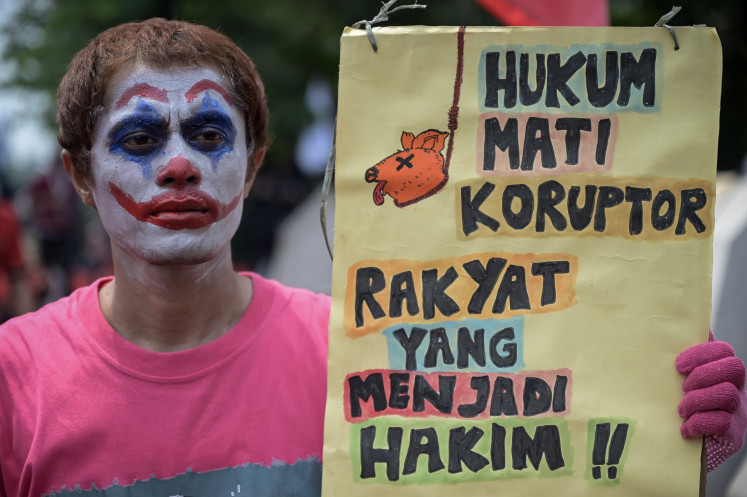Popular Reads
Top Results
Can't find what you're looking for?
View all search resultsPopular Reads
Top Results
Can't find what you're looking for?
View all search resultsGovt to revise CPO export duty rule
The government will likely change the regulation that sets the crude palm oil export tax amid growing protests from producers, a senior trade official said in Jakarta on Friday
Change text size
Gift Premium Articles
to Anyone
T
he government will likely change the regulation that sets the crude palm oil export tax amid growing protests from producers, a senior trade official said in Jakarta on Friday.
Trade Ministry foreign trade director general Deddy Saleh said that the new regulation on CPO export tax might be issued by the Finance Ministry next month as a response to the producers’ protests.
Deddy said the new regulation would introduce a new mechanism for determining export duty as well as reference prices.
“[Under the new regulation] the export duty will remain progressive, but it will accommodate all interests,” he told reporters after a press briefing on sugar at the ministry’s office.
He added that the regulation would also use palm oil reference prices in three markets: Jakarta (Indonesia), Kuala Lumpur (Malaysia) and Rotterdam (the Netherlands) to ensure that more accurately reflected the market prices.
“Our ministry will set a calculation formula for the import duty and the conversion of the price in [US] dollars, ringgit and rupiah to be used every month,” Deddy said. “We are waiting for the regulation to make the formula,” he said.
Under Government Regulation No. 223/2008 on export duties of commodities, the government imposes a progressive tax system on palm oil exports based on the average international palm oil prices.
The reference price is set by the government to determine palm oil export taxes. Currently, oil palm prices are established according to the average price index in the commodities exchange in Rotterdam, the Netherlands, a month before the establishment of the export base price.
The Indonesian Palm Oil Producers Association (Gapki) chairman Fadhil Hasan, however, said that the proposed new regulation might not bring significant benefits for palm oil producers.
“If the tax system remains progressive, it means there’s no significant change in the regulation,” he said.
“Current progressive export taxes are reducing the competitiveness of our products in the international market. They are also detrimental to our farmers,” Fadhil told The Jakarta Post in a phone interview.
Fadhil said the progressive tax system, in fact, failed to achieve its goal of stabilizing prices of edible oil in the domestic market as well as encouraging growth in the downstream industry. He cited as an example the 1998-1999 period during which the export duty on palm oil hit 60 percent, but nevertheless did not stimulate the development of the domestic downstream palm oil industry.
According to Fadhil, such an insignificant change of the palm oil export tax system would continue to hurt local palm oil producers and might encourage smuggling.
On Wednesday, the government announced that the export duty for July deliveries would be 20 percent, rising from 17.5 percent in June. The new duty is based on the July reference price of $1.168 per metric ton. The export duty hit 20 percent in February and March this year.
Indonesia is now the largest palm oil producer in the world, followed by Malaysia. Indonesia’s palm oil export volume rose by 0.8 percent to 15.66 million tons last year from 15.53 million tons in 2009 on the back of high exports to three major importers: India, China and the EU.
Meanwhile, the export volumes of palm oil jumped by 64 percent to US$16.4 billion in 2010 from $10 billion in 2009 on the back of surging prices, especially during the last quarter of last year.










